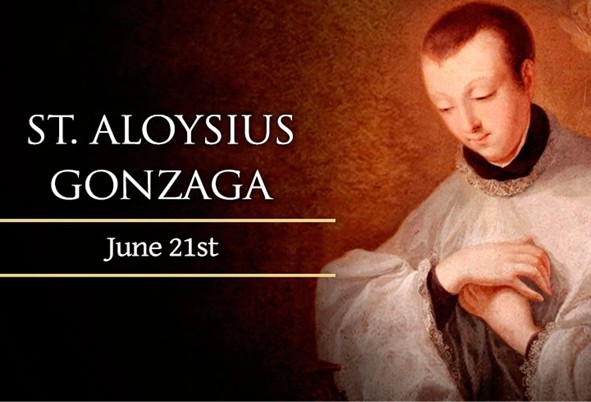THE FATHER'S STRENGTH IN OUR WEAKNESS
SAINT ALOYSIUS GONZAGA, RELIGIOUS
2 Cor 12:1-10; Ps 34:8-13; Mt 6:24-34
The
Strength of Weakness
Throughout
the week, we have meditated on the spirituality corresponding to the revelation
of the Trinity by Jesus Christ. We have come to understand that the foundation
for Trinitarian spirituality is the establishment of the consciousness of the
heavenly Father within us. It cannot be otherwise because Jesus Christ reveals
himself to us as the Son of God in human nature. Since his consciousness among
us remained that of the Son, he carried and established the force field of his
love for the Father through his life and ministry on earth. Every thought,
word, and action of the Son of Man relates us to the heavenly Father whose love
he demonstrated to us through his life, death, and resurrection. His total
submission to the will of the Father in heaven outlined the highway of
salvation for us sinners. The highway defines for us the essence of religion,
sacrifice, and worship of God. It leads us to the possession of our
inheritance, for it is a following of the will of the Father every day. Our
inheritance, which is the heavenly Father, belongs to the Son by right; we are
only coheirs with Jesus Christ. But in essence, Jesus Christ inherits the
Father; we are coheirs because we live no longer but Jesus Christ living in
each of us, his members. Thus, after the vision of the heavenly inheritance,
God purged Paul of everything that was not of Christ in him. “In view of the
extraordinary nature of these revelations, to stop me from getting too proud I
was given a thorn in the flesh, an angel of Satan to beat me and stop me from
getting too proud!”
God
permits the sufferings and trials we go through in life, not because he enjoys
our pains and discomfort, but as a loving father who would eagerly give a
bitter medication to his sick son or administer a painful process to make his
son well. Our sure anchor for walking through the highway of the mysteries of
Jesus Christ is our faith in the heavenly Father and our confidence in his
unfailing love for us. The desirable faith is that of Jesus Christ in his
heavenly Father. Thus, he admonishes us. “That is why I am telling you not to
worry about your life and what you are to eat, nor about your body and how you
are to clothe it. Surely life means more than food, and the body more than
clothing! Look at the birds in the sky. They do not sow or reap or gather into
barns; yet your heavenly Father feeds them.” The heavenly Father cares for us.
Since Our Father is almighty, he has arranged all things for our salvation.
Thus, he responded to Paul in his demonic affliction, assuring him of his
perpetual protection. “My grace is enough for you: my power is at its best in
weakness.” The heavenly Father’s plan takes into account every minute detail of
our lives, “Now if that is how God clothes the grass in the field which is
there today and thrown into the furnace tomorrow, will he not much more look
after you, you men of little faith?” The wisdom of the Father and his infinite
power govern every part of material creation with love and care, how much more
the intricate creation of our spiritual reality.
According to our Lord, our worries and agitations concerning the passing things of this world show our lack of faith in the heavenly Father. Hence, we have stated that the purpose of teaching us his prayer is to produce his own disposition as the Son in each of us as we recite and meditate on the words daily. The efficacy of the holy Rosary again rests on the fact that its principal part is the Lord’s prayer. The prayer helps us to set our hearts on the kingdom of God while trusting God for our temporal needs. “Set your hearts on his kingdom first, and on his righteousness, and all these other things will be given you as well.” We see this lesson exemplified in the life of Aloysius Gonzaga. He was born in 1568 as the eldest son of a Mantuan nobleman. His father wanted him to be a soldier, while he desired to be a missionary and die for the faith. He renounced his birthright in favour of his brother and joined the Jesuit Novitiate at the age of 16 in Rome. He lived an austere life. He worked in the hospital opened by the Jesuits during the outbreak of the epidemic in 1591 in Rome. He caught the plague and died of it on the 20th of June of the same year.
Let us pray: O God, giver of heavenly gifts, who in Saint Aloysius Gonzaga joined penitence to a wonderful innocence of life, grant, through his merits and intercession, that, though we have failed to follow him in innocence, we may imitate him in penitence. Through our Lord Jesus Christ, your Son, who lives and reigns with you in the unity of the Holy Spirit, God, for ever and ever.


)_20240318_002227_0000.jpg)

Comments
Post a Comment